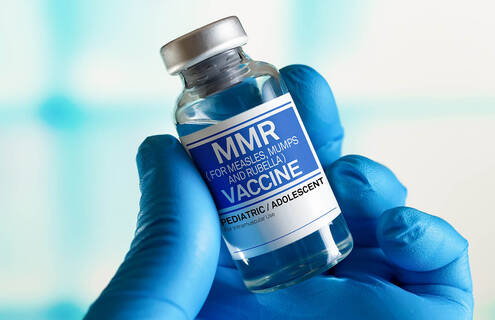
With reported measles cases in New Hampshire and Vermont, health experts stress that getting vaccinated remains the best protection for children 12 months and older and that maternal antibodies can largely protect those younger than a year old.
“Measles vaccinations are very, very safe,” says Susanne E. Tanski, MD, MPH, Section Chief, General Pediatrics at Dartmouth Health Children’s. “The most important thing that parents can do to protect their children from measles is to make sure their kids and families are vaccinated and up to date with the two-dose series. Herd immunity is important to protect those who are too young to vaccinate and for those with compromised immune systems."
More about measles
While recent cases in the region are few, measles remains a serious disease that can easily infect those who are unvaccinated.
The CDC (Centers for Disease Control and Prevention) says it is one of the most contagious viruses, spreading through contact with infectious droplets or through the air.
The virus can linger up to two hours after an infected person has been in the area. Common symptoms include a high fever, cough, runny nose, conjunctivitis, and a rash.
How it got here
While measles was declared eliminated from the United States in 2000, travelers who may not even know they have measles can bring the disease into the country. Anyone with measles can spread the disease rapidly to others who are unvaccinated.
Recently, cases have been rising. This summer, state officials from New Hampshire and Vermont have confirmed that an international traveler in New Hampshire had measles, exposing and infecting a few others with the disease.
Why vaccines matter
Even with the slight uptick, vaccinations continue to provide the best protection for children against the disease.
“Measles vaccines are very safe and highly effective,” says H. Cody Meissner, MD, Professor of Pediatrics at Geisel School of Medicine at Dartmouth.
People who are vaccinated have high levels of protection from measles: one dose is about 93% effective at preventing infection and two doses about 97% effective.
Ideally, children should receive the MMR (measles, mumps, and rubella) vaccine in two doses before the age of six.
“We vaccinate first between 12 and 15 months of age. We give the second dose between the ages of four and five,” says Tanski.
How to protect your child under one year old
Maternal antibodies protect children under one year old. But because antibodies start to wane at six months, susceptibility to the disease can increase until children receive their first vaccination.
"If your child who's under the age of 12 months has a known exposure to measles, we do post-exposure prophylaxis if we find out about the exposure early enough. What that means is your baby (who has been exposed) may be able to get injections to prevent them from getting sick from measles.”
If there is any concern about a possible exposure to your baby or unvaccinated child, parents should contact their child's doctor right away.
If your child has measles
You should also notify your pediatrician if you suspect your child may have measles. Early symptoms may include high fever, cough, red eyes (conjunctivitis), runny nose, and tiredness. After a few days of those symptoms, the rash starts. Vaccinated children rarely get measles, but it is possible, so when measles is in a community it is important to be aware of the possible symptoms.
Typically, people are contagious for four days before and after the rash appears. In general, symptoms develop 10 to 14 days after exposure but may not appear for as long as 21 days.
Fortunately, most measles patients recover within a week, but sometimes complications do arise. These include ear infections, dehydration, pneumonia, or more rarely, meningitis. About one in five children with measles will have a complication that leads to hospitalization.
Measles is highly contagious
“Measles is one of the most contagious viruses there is, with nine out of ten people without immunity contracting the virus after exposure,” says Tanski.
Tanski recommends that anyone unvaccinated who is one year old or over get their vaccination scheduled.
If you do not know whether your child or you have had a measles vaccination, you can contact your doctor to check the patient's immunization history. According to the CDC, about 90% of the US population is immunized. If you are unsure, you can ask a provider to do a blood test for antibodies, which protects against future infections.
The outlook in our New Hampshire and Vermont area
“The Department of Health is actively monitoring for additional cases in the community,” concludes Tanski.
“Thankfully, most people are vaccinated against measles as children, and the vaccine provides lifelong protection.”
New Hampshire and Vermont vaccination resources
The NH Immunization Program (NHIP) is a vaccine resource for healthcare providers, schools, childcare providers, families, and the general public. The New Hampshire DHHS (Department of Health & Human Services), through the NHIP's Vaccines for Children (or "VFC") program, provides all the recommended vaccines for every child in the state, regardless of insurance or income. DHHS urges individuals and caregivers to talk with their healthcare provider about which recommended vaccines are right for them.
The Vermont Department of Health provides this information about measles, reminding people that measles is preventable when people get vaccinated. They point out that even though measles was declared eliminated in the United States in the year 2000, outbreaks can happen in communities with low immunization rates.